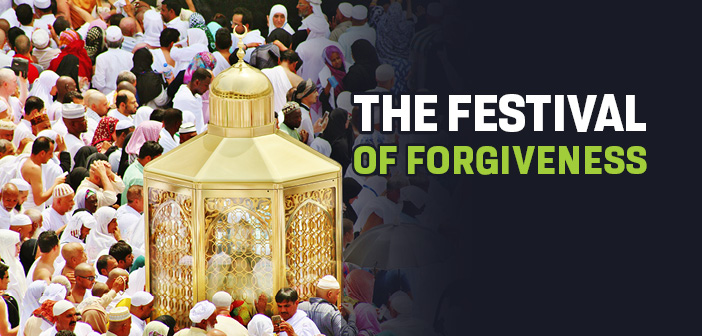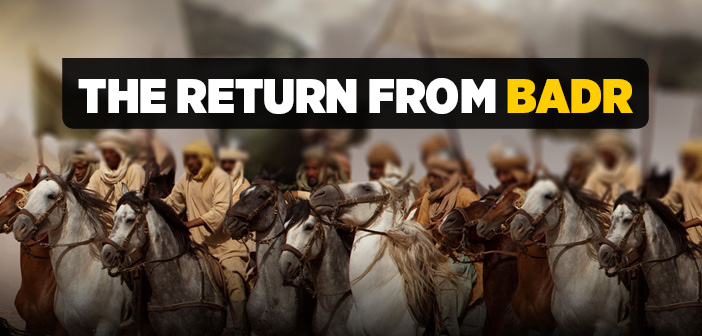What is the festival of forgiveness? What does forgiveness means in islam?
The Meccans had crammed inside the Masjid’ul-Haram, nervously awaiting their verdict. The Blessed Prophet -upon him blessings and peace- gave a short speech, applicable not only to Quraysh but also to the entire humankind:
“There is no god but Allah. There is only He. He has no resemblance, no partner. Allah has fulfilled His promise, helped his servant and dispersed all our enemies. Except for Kaabah’s service and providing the pilgrims with water, all customs and practices of old, feuds of blood and property, today lie under my feet.
Quraysh…!
Allah has rid you of the pride of Ignorance, of boasting with fathers and lineage. All humans are created through Adam and Adam from soil.”
The Prophet of Allah -upon him blessings and peace- then read out the below ayah:
“O mankind! We created you from a single (pair) of a male and a female, and made you into nations and tribes, that you may know each other. Verily the most honoured of you in the sight of Allah is (he who is) the most righteous of you. And Allah has full knowledge and is well acquainted (with all things).” (al-Hujurat, 13)” (Ibn Majah, Diyat, 5; Ahmad, II, 11; Tirmidhi, Tafsir, 49/3270)
By virtue of a spiritual fath entwined with forgiveness, peace, security and guidance, as promised at Hudaybiyah, Mecca had now opened its heart to her true dwellers, her beloved community. The pain and agony ridden separation from Mecca was now over. Years of grief had now made way for joy. As an expression of gratitude for this tremendous turnaround, moments before declaring the greatest amnesty in history, the Blessed Prophet asked Quraysh:
“What do you suppose I will do with you, Quraysh?”
“We expect you to do what is good and favorable …so we will say you will only do what is good. You are a generous and noble brother and nephew!”
The Noble Messenger -upon him blessings and peace- thus replied, “Just as Yusuf said to his brothers, so shall I say:
‘There shall be no reproof against you this day; Allah may forgive you, and He is the most Merciful of the merciful.’ You are all free to leave!”
And in another instance, he said, “Today is the day of mercy. Today is the day in which Allah shall strengthen and elevate Quraysh with Islam.”
Consequently, even those who had the blood of many Muslims on their hands prior to the fath accepted Islam. Allah, glory unto Him, had placed Quraysh in the mercy of His Messenger and made them succumb to him. In turn, the Noble Messenger -upon him blessings and peace- had forgiven them and allowed their release. The Meccans were thereafter also known as tulaqa, that is to say, those who were set free.[1]
The Prophet’s -upon him blessings and peace- greatest desire was for entire humankind to accept Islam, exclusively, without a single person left out. At a time when he was at the peak of his power, despite it being well within his right to take revenge from people who had subjected him and his fellow Companions to the most awful treatment, the Blessed Prophet -upon him blessings and peace- declared an official amnesty, an extraordinary manifestation of his viewing of the created with the merciful sight of the Creator.
Mecca, having witnessed nothing but oppression, mockery and enmity for years on end, was now making the most of the sweet breeze of compassion and mercy, ensured by the great forgiveness gusting throughout. But a Meccan by the name of Fadala, with the intention of casting a grim shadow over this pleasant day, approached the Blessed Prophet -upon him blessings and peace- with the intention of killing him. Yet, possessing insight to his malicious intention all along, without showing any sign of panic or anger, the Blessed Prophet -upon him blessings and peace- spread his wings of mercy for Fadala and, placing his graceful hands on Fadala’s chest, said:
“Repent, Fadala, from the plot you have contrived in your mind!” The malicious intention disappeared from Fadala’s mind there and then; his heart melted and was thereby filled with the light of iman. In his sight, the Messenger of Allah -upon him blessings and peace- suddenly became the most beloved of all beings. (Ibn Hisham, IV, 37; Ibn Kathir, as-Sirah, III, 583)
Abu Sufyan was sitting by Kaabah, thinking and weighing his options. Gathering men against the Blessed Prophet -upon him blessings and peace- and resuming his fight against him anew crossed his mind at one stage, especially after seeing the Believers walk behind in large numbers behind the Prophet of Allah -upon him blessings and peace-. He was carried away assessing the option, when the Blessed Prophet -upon him blessings and peace-, without him realizing, came and stood beside him; and tapping him on the back, right between his shoulder blades, said, “…That is when Allah will make you despicable and disgraced!”
Lifting his head, Abu Sufyan saw the Noble Prophet -upon him blessings and peace- standing beside him, upon which he said, “I could not fully comprehend you being a prophet until now; and now, I repent to Allah for the thoughts that passed through my mind and ask for His forgiveness!” (Ibn Kathir, al-Bidayah, IV, 296)
Hind, who had plunged her teeth into Hamza’s -Allah be well-pleased with him- severed liver in the aftermath of the Battle of Uhud, also became Muslim on the Day of Fath, and hence enjoyed her share of the general amnesty. She was forgiven by the Blessed Prophet -upon him blessings and peace-, for the sake of the honor held by the word of tawhid.[2]
Iqrimah, Abu Jahl’s son, among the most inveterate enemies of Islam, had fled to Yemen immediately after the arrival of the Muslim army in Mecca. Eventually, he was brought to the presence of the Blessed Prophet -upon him blessings and peace-, by his wife, as a Muslim. The Prophet of Mercy -upon him blessings and peace- received him amicably. “Welcome, you wandering cavalier” he said lightheartedly, not holding against him the crimes he had committed against Muslims. (Hakim, III, 271/5059; Waqidi, II, 851-852)
Like Iqrimah, Habbar ibn Aswad was among the most prominent enemies of Islam. With his spear, he had spitefully poked the camel on which Zaynab -Allah be well-pleased with her- was astride, bound for her Hegira to Medina, causing the daughter of the Noble Prophet -upon him blessings and peace- to fall of, consequently leaving her bloody and bruised, and above all, with a miscarriage of the baby she was pregnant with at the time. Most regrettable was the fact that the severe wound eventually ended being the cause of her death a while later. Habbar was the culprit of many vicious crimes alike. He had fled on the Day of the Fath of Mecca, eluding all attempts of being captured. A while later he tentatively appeared in Medina at the presence of the Prophet of Mercy -upon him blessings and peace-, as he was sitting with the Companions. All he did was to announce he had become Muslim. Not only did the Prophet -upon him blessings and peace- forgive him, he moreover prohibited all others from even abusing Habbar and throwing him insults.[3] After all, the Holy Quran had stated:
“Take to forgiveness and enjoin good and turn aside from the ignorant.” (al-Araf, 199)
The Blessed Prophet -upon him blessings and peace- was the Quran come to life. He was the walking display par excellence of Quranic morals. He would forgive all the crimes committed against him without a moment’s hesitation. As for crimes committed against others, however, nobody could calm him until he elevated justice to its deserved place and restored the right of the victim. Indeed, together with declaring a never before seen all inclusive amnesty, for the sake of the benefit of the ummah, the Prophet of Allah -upon him blessings and peace- also ordered an on the spot execution of a very few number of incurable idolaters, whose conditions were beyond rehabilitation.[4]
No spoils were taken from Mecca.[5] The Noble Messenger -upon him blessings and peace- instead borrowed a loan from the wealthy figures of Mecca to cover the hefty yet necessary expenses of the Muslim army, which he later paid back with the spoils of Hawazin, stating, “A loan merits a thanks and repayment.” (Waqidi, II, 863; Abu Dawud, Buyu’, 88/3562; Nikah, 44)
With the Meccans still enjoying the ambiance of mercy they were provided by the amnesty of Blessed Prophet -upon him blessings and peace-, it was now noon. As always, the Noble Messenger -upon him blessings and peace- signaled for Bilal Habashi -Allah be well-pleased with him- to call out the adhan for the zuhr salat. Bilal -Allah be well-pleased with him- remembered the days of his slavery, when he moaned ‘Ahad, Ahad’ under excruciating torture. Oppression had now reached its twilight. He had now come to Mecca free man, as a member of a triumphant army of iman. Thanking Allah, glory unto Him, he climbed on the roof of Kaabah and begun calling out the adhan, in a passionate tone. So emotional and touching was Bilal’s adhan that all the surrounding mountains and the sky were virtually reverberating with its sound. The skies were alight, the ground delighted. The adhan Bilal -Allah be well-pleased with him- called that day left a lasting memory for all Believers to cherish. Some of the idolaters who stood witness to the scene were heard to remark, “Shame on us…we could not even be like slaves! Look at how high they are at and how low we have remained!” They were only lamenting their past deeds, the fact that they had remained oblivious to the Truth until then.
[1] See, Ibn Hisham, IV, 32; Waqidi, II, 835; Ibn Saad, II, 142-143.[2] Waqidi, II, 850.[3] Waqidi, II, 857-858.[4] Abu Dawud, Jihad, 117/2683; Nasai, Tahrîm’ud-Dam, 14.[5] Abu Dawud, Kharaj, 24-25/3023.
Source: Osman Nuri Topbaş, The Prophet Muhammed Mustafa the Elect II, Erkam Publications





